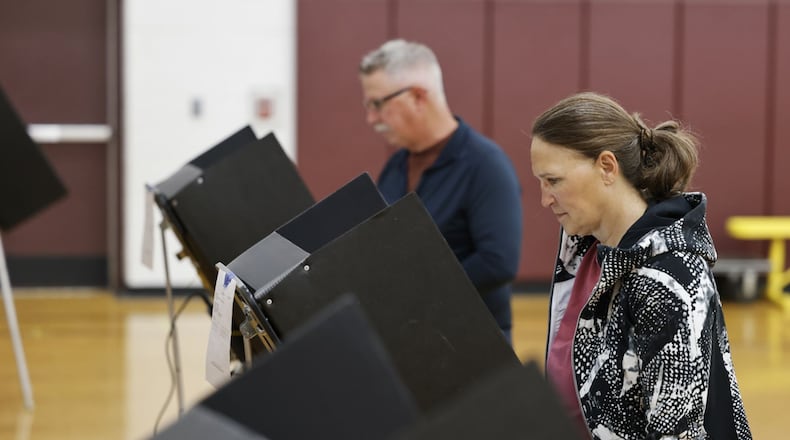And in the aftermath of Edgewood voters rejecting that district’s 1% earned income tax ballot issue, officials there are now moving into a new phase of further budget reductions for the next year.
While the districts do not have the same local funding history, the identical outcome from Tuesday’s election means both Ross and Edgewood schools will see deep budget cuts and look different by the start of classes in August.
Ross School voters again rejected a property tax levy despite the 2,800-student district in recent months falling under the Ohio Department of Education (ODE) and Ohio Auditor’s office designation of “fiscal caution.”
The unofficial vote tally from Tuesday, according to the Butler County Board of Elections, saw Ross’ 5-year, 9.44-mill emergency property tax increase losing by a 59% to 41% margin.
Officials with Ross Schools had warned the community millions of dollars in sweeping student program and school personnel cuts would follow a third straight voter rejection.
Moreover, they said the district’s fiscal caution status will now mean state officials are closer to dictating the size of the next, larger school levy, which will likely be on the ballot in the fall.
If the levy had been approved, it would have raised the annual school tax due for the owner of a $100,000 home by $330.
The ballot defeat will trigger millions of dollars in additional school budget cuts for the next two school years with deep impacts on what has been in the last decade-plus one of Butler County’s most successful school systems.
Mandy Rice, campaign manager for the pro-levy effort, said levy outcome reflects the community’s wish “for a certain caliber of school and that is exactly what the community is going to get.”
“A school system is only as great as the community that votes for or against it,” Rice told the Journal-News.
“Just like when a business doesn’t have revenue, it has to make those (budget) cuts and that is exactly what has to happen.”
Long-time Ross resident Rick Giuliano, who voted for the levy, said its loss wasn’t surprising and that Ohio’s long-criticized problems with its public school funding process has shackled district’s like Ross.
“I am extremely disappointed at the results. I’m not sure who to blame. The state, people like myself who are on fixed incomes, but not the district. They have done as much as they can,” Giuliano said of Ross district officials.
“There are various reasons that could all contribute to this outcome. All I know is our students are suffering in the long run. Something has just got to give,” he said.
Fellow Ross resident Caroline Frommer, who lives on a fixed income, paused on her way to voting Tuesday and said she was torn by the levy issue and how she should vote, eventually deciding to oppose it.
“I’m for the kids and the kids need this (levy) but being a senior citizen on a fixed income …you’re paying a thousand dollars a year more,” said Frommer. “And for somebody on a fixed income, a thousand dollars is a lot. I’m not getting raises anymore.”
“I don’t want to do it (vote no) but I have to.”
Edgewood voters defeated the school system’s proposed 1% income tax by a 57% to 43% margin, according to unofficial ballot results.
The proposed earned income tax hike, which would not have impacted Edgewood school residents on fixed incomes or those retired, was the first time the 3,600-school system had been on the ballot asking for new operating funds since 2005.
Without new operating funds from raise in local tax revenue, Edgewood officials have warned of pending budget cuts that would include reductions in student programs and school personnel.
Other possible budget cuts could include the elimination of high school busing and elective course offerings including possibly advanced classes.
The district, which like all public school systems is mandated by Ohio law to operate without prolonged budget deficits, has already cut $1.6 million during the current 2022-2023 school year from its $38.7 million annual operating budget.
An additional million dollars more of operating costs would be required to be eliminated in the wake of Tuesday’s loss at the election polls, said district officials.
Edgewood Schools Superintendent Kelly Spivey acknowledged the complaints of some voters going to the polls as they cited the increased inflationary costs in recent years for their “no” vote on approving the 1% earned income tax.
“We understand that this request is being made during difficult economic times,” Spivey told the Journal-News.
What’s next will also include an outreach to the school community and others, she said.
“With the failure of this levy, the Edgewood School Board, treasurer, and I will use the community survey results and return to the drawing board. We have some difficult decisions to make as we strive to make another $1million dollar of cuts in order to certify the next five year (state mandated) forecast,” said Spivey.
“Some of the items we will be looking at are reducing transportation to state minimum (no high school busing), reducing the amount of elective course offerings, eliminating extra-curricular activities or increasing pay-to-play (from $150 per sport and activity) to $800 to $900 per sport, and a reduction of staff members to include administrators, certified, and classified employees.”
One of the voters who voted to reject the proposed tax hike said Edgewood officials need to be more fiscally diligent.
“I think we have a school board that needs to learn to live within their budget,” said James Bussell after voting “no” on the proposed tax.
About the Author

